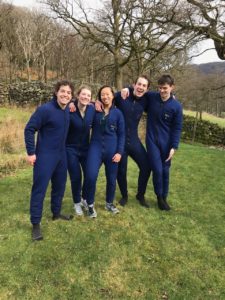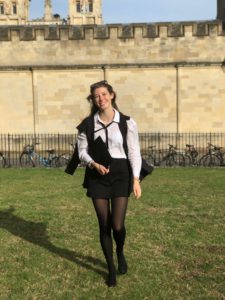Grad School Prep Abroad: 5 months at one of the best research institutions in the world
Going into my year abroad, I felt very split on my post-grad plans. I had been half-considering applying to medical school due to the encouragement of many adults in my life who had taken my interest in science to equate a career in medicine; but had also just come off of a summer of doing biophysical research in a lab at my home institution.
The program at St. Anne’s that I did through IFSA was a biochemistry pre-med program, with a popularity amongst students wishing to undertake an MD-PhD. It had the courses I needed to complete my molecular biology major, with an optional research project in the spring that could be completed with an Oxford faculty member of my choosing. I had really enjoyed my summer research, so I made sure to tell my primary tutor (similar to an advisor) that I would be choosing to complete the project in the spring when we first met to go over my schedule for the year.
Help from my on-site director
My on-site director, Andrew, asked me at our first meeting what I hoped to get out of my year at Oxford. I did not realize how much my year away could help me in my life goals down the road, since years abroad are often valued in the US college system as more of a time of personal growth, rather than career growth. Andrew luckily corrected this perception in me, and we discussed my hopes to get into a research lab in the spring. I already knew of a Professor whose work interested me, so when November rolled around and we were nearing the Christmas break, Andrew encouraged me to reach out to the Professor to start laying the ground work of getting in for a research project. After much anxiety over the wording of my email (with some drafting help from Andrew), I reached out and met with the Professor once before Christmas, establishing that I would come to their first lab meeting in the new year to see what projects I could contribute to.
Invaluable Research Experience

This lab group that I ended up joining and project I completed under the advising of a wonderful and patient PhD student changed the course of my collegiate plans and consequentially my career plans. My home institution is a small liberal arts school with a shared science department between us and two other small undergraduate colleges in my consortium. While we have an amazing faculty, who create great research labs that are composed almost entirely of undergraduates, the resources and continuity within projects are limited by a lack of funding and a lack of full-time staff. The University of Oxford departments of sciences are historically Nobel prize winning, with state-of-the-art facilities, equipment and hundreds of full time PhD candidates, post-doc researchers, and PIs at the cutting edge of scientific research in the world. I got to spend just under five months in my lab team working on my own project that fitted into the research of my advisor, and finished the year writing a 22 page lab report that gave me great practice for writing my senior thesis this fall.
This project gave me the best experience of what working in a PhD lab would be like, working about 30 hours a week on my project. Weekly group meetings meant I got to learn about the projects of each member in the team, and I got to present my research to them twice which gave me practice in how to speak to a scientific community. Most importantly, my time spent doing research abroad gave me the confidence to make a decision about my post-grad plans; applying for PhD programs!
Notes on STEM Abroad

This project was just one of the many ways that doing STEM abroad has made me feel more deeply rooted in science. Unfortunately STEM students are often discouraged from going abroad for fear of creating a mess of a schedule when they return to complete all of their degree requirements. I would encourage my peers to ignore this pressure and consider studying abroad, because I believe it makes you a better scientist who may one day contribute to the global community. The pedagogy in the UK was so different from what I have encountered in the US in terms of depth of material and scientific writing. Since they focus their degrees on one singular subject, they are required to go much further in depth than we have time for with our many general education requirements and time spent in the humanities at liberal arts colleges. I feel so lucky to have had a year where I got to explore my academic curiosities in depth, and think that I gained global scientific literacy that will help me if I pursue a career in academia. We are conditioned to believe that because science is the concrete study of fact, there is one correct way to learn it, doing problem sets and taking exams. This is not necessarily true, and getting to experience a different method of teaching biochemistry and related subjects through essay writing and defending my own scientific theories gave me this realization and a more holistic approach to why I study the subject.
Gabriella Kimmerly is a Molecular Biology student at Scripps College and studied abroad with IFSA at the University of Oxford – St. Anne’s Pre-med programme in England in the 2018 – 2019 Academic Year.
